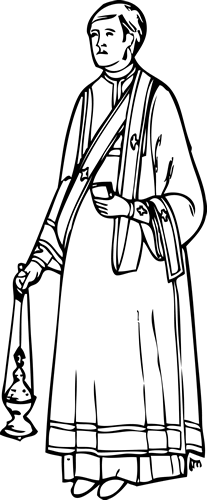|
|||
|---|---|---|---|
| This weekly bulletin insert complements the curriculum published by the Department of Christian Education of the Orthodox Church in America. This and many other Christian Education resources are available at http://dce.oca.org. | |||

Sometimes the Church celebrates the memory of not one person but a large group of martyrs. One such group-—twenty thousand men, women and children--gave their lives early in the fourth century. These Christians are known as the 20,000 Martyrs of Nicomedia, a city in the northwestern area of what is now Turkey. Because they were living during the reign of the emperor Maximian Hercules, their faith put them in serious danger. The pagan emperor was eager to reduce the growing number of Christians, who seemed a threat to his own authority. He saw a chance as the Feast of the Nativity approached in the year 302. Nicomedia had an especially large Christian population, and the believers would be gathered in the local church for the feast, beginning their worship in the first hours of the new day. Sure enough, soon after midnight the church was so full of people that there was hardly room to stand. Candles, incense, chanted prayers and singing added to the festive atmosphere, in anticipation of the service that was about to begin. But the emperor had made his plans. His soldiers, at the command of his official representative, surrounded the church so that nobody could get out. Then the official pushed his way to the front of the church. He announced that the gathered believers had a choice: they could offer sacrifice to the gods immediately, or be burned to death by the soldiers who were prepared to set the building aflame with everyone inside. The stunned Christians realized that they had no chance of escape against the armed soldiers surrounding them. Before panic could set in, the courageous archdeacon rose and addressed the crowd with great passion. "My brothers and sisters!" he called out. "Think of where we are, and remember the reason why we have gathered tonight. We have come to celebrate because Our Lord was born as a Man, to come among us and save us. He is about to be sacrificed for us on the holy altar as we perform the Divine Liturgy. Should we not be ready to sacrifice our lives for Him in this holy place, at this holy time?" These words inspired the believers. Overcoming fear, they were ready now to submit to the terrible flames, still singing praise to God. The church burned for days, but the smoke didn't put forth the usual stench. Instead it was fragrant, and those who passed the ruined building saw a golden light, caused by something other than fire, emanating from it.
I Timothy tells us, "Fight the good fight of the faith; take hold of the eternal life to which you were called when you made the good confession in the presence of many witnesses" (6:12). That night in Nicomedia, twenty thousand martyrs "took hold of eternal life" in a way they didn't expect. But what better way could there be than singing to the Lord in church, in celebration of His birth for our salvation? |
|||
